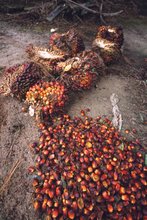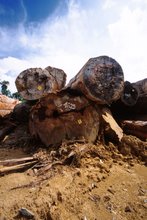A look at some of the victims of the burgeoning bio-fuel market. At a time when George Bush is pledging support for Indonesian bio-fuel production, social and environmental groups such as Wetlands International and Biofuel Watch release figures that show the use of palm oil from unsustainable conversion of natural forest can leave a carbon footprint 10 times greater than using fossil fuels. The biofuel argument begins to falter in the face of these figures. We need a 100% sign up to sustainable palm oil right now for palm oil to stop having these devastating impacts on local people, indigenous species and the world climate.
Remember if farmed properly oil palm plantations will give a net benefit to climate, especially if they are grown in degraded land that is now covered in grass and is subject to the annual burn cycle in Kalimantan.
Remember if farmed properly oil palm plantations will give a net benefit to climate, especially if they are grown in degraded land that is now covered in grass and is subject to the annual burn cycle in Kalimantan.







1 comment:
Some Reflections
Now, it is easy for the EU, the Wall Street Journal and the author to take pot shots at Malaysia and Indonesia for attempting to lift themselves up economically by cultivating palm oil for biofuels. In fact, the Malaysian Palm Oil Council issued a rebuttal to some topics reviewed in this story. And although some of it is ridiculous, it does point out obviously hypocritical things like this —
Britain has little forest left, as most land has been converted to agriculture. Such a paucity of forest cover and the preponderance of agricultural land have resulted in reduced biodiversity and caused the loss of fauna and flora.
According to data from the Food and Agriculture Organisation, Britain has less than 12 per cent of its land under forest cover compared with 64 per cent for Malaysia. Agricultural land makes up 71 per cent of its total land area compared with less than 19 per cent in Malaysia, of which oil palm accounts for two-thirds.
In the 19th century, Europeans were despoiling southeast Asia for the rubber and timber trades. From the WSJ, peaking of Borneo —
In the 1800s, Dutch and British traders began carving up parts of the island to produce rubber and other commodities. Later, Malaysian and Indonesian timber barons devastated millions of hectares of forest logging tropical hardwoods. Today, only a little more than half of Borneo's once-ubiquitous rain-forest cover remains, according to WWF, the global conservation organization.
As a citizen of the United States — the world's largest natural resource consumer driving much of the planet's freefall — and largest abuser of the global commons, which is the environment upon which we all ultimately depend, I must add this apologetic to my criticisms of land use practices in southeast Asia. After all, people are just trying to feed themselves, raise their families and prosper economically as far as that is possible. Quoting the WSJ concerning Indonesia, "the arrival of new palm-oil plantations has meant jobs and opportunities for many Dayak families [of Kalimantan], and some have even taken ownership stakes in the operations." There are environmentalists in southeast Asia just as there are here among the NGOs in America — I have quoted some of them. At the same time, John Q. Suburban in the United States is just trying to feed himself, raise his family and prosper economically as far as that is possible.
So, in the short run, some will win, some will lose and everyone wants to live. Over the longer term, however, the underlying problem is too many people (wherever they live) consuming too much energy and other natural resources. Overshoot and unsustainable modes of living are not confined to southeast Asia, as any American should know.
Dave Cohen
Senior Contributor
The Oil Drum
davec @ linkvoyager.com
Post a Comment